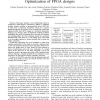Free Online Productivity Tools
i2Speak
i2Symbol
i2OCR
iTex2Img
iWeb2Print
iWeb2Shot
i2Type
iPdf2Split
iPdf2Merge
i2Bopomofo
i2Arabic
i2Style
i2Image
i2PDF
iLatex2Rtf
Sci2ools
119
click to vote
SAMOS
2007
Springer
2007
Springer
An Evolutionary Approach to Area-Time Optimization of FPGA designs
—This paper presents a new methodology based on evolutionary multi-objective optimization (EMO) to synthesize multiple complex modules on programmable devices (FPGAs). It starts from a behavioral description written in a common high-level language (for instance C) to automatically produce the register-transfer level (RTL) design in a hardware description language (e.g. Verilog). Since all high-level synthesis problems (scheduling, allocation and binding) are notoriously NP-complete and interdependent, the three problems should be considered simultaneously. This drives to a wide design space, that needs to be thoroughly explored to obtain solutions able to satisfy the design constraints. Evolutionary algorithms are good candidates to tackle such complex explorations. In this paper we provide a solution based on the Non-dominated Sorting Genetic Algorithm (NSGA-II) to explore the design space in order obtain the best solutions in terms of performance given the area constraints of a tar...
Related Content
| Added | 09 Jun 2010 |
| Updated | 09 Jun 2010 |
| Type | Conference |
| Year | 2007 |
| Where | SAMOS |
| Authors | Fabrizio Ferrandi, Pier Luca Lanzi, Gianluca Palermo, Christian Pilato, Donatella Sciuto, Antonino Tumeo |
Comments (0)

